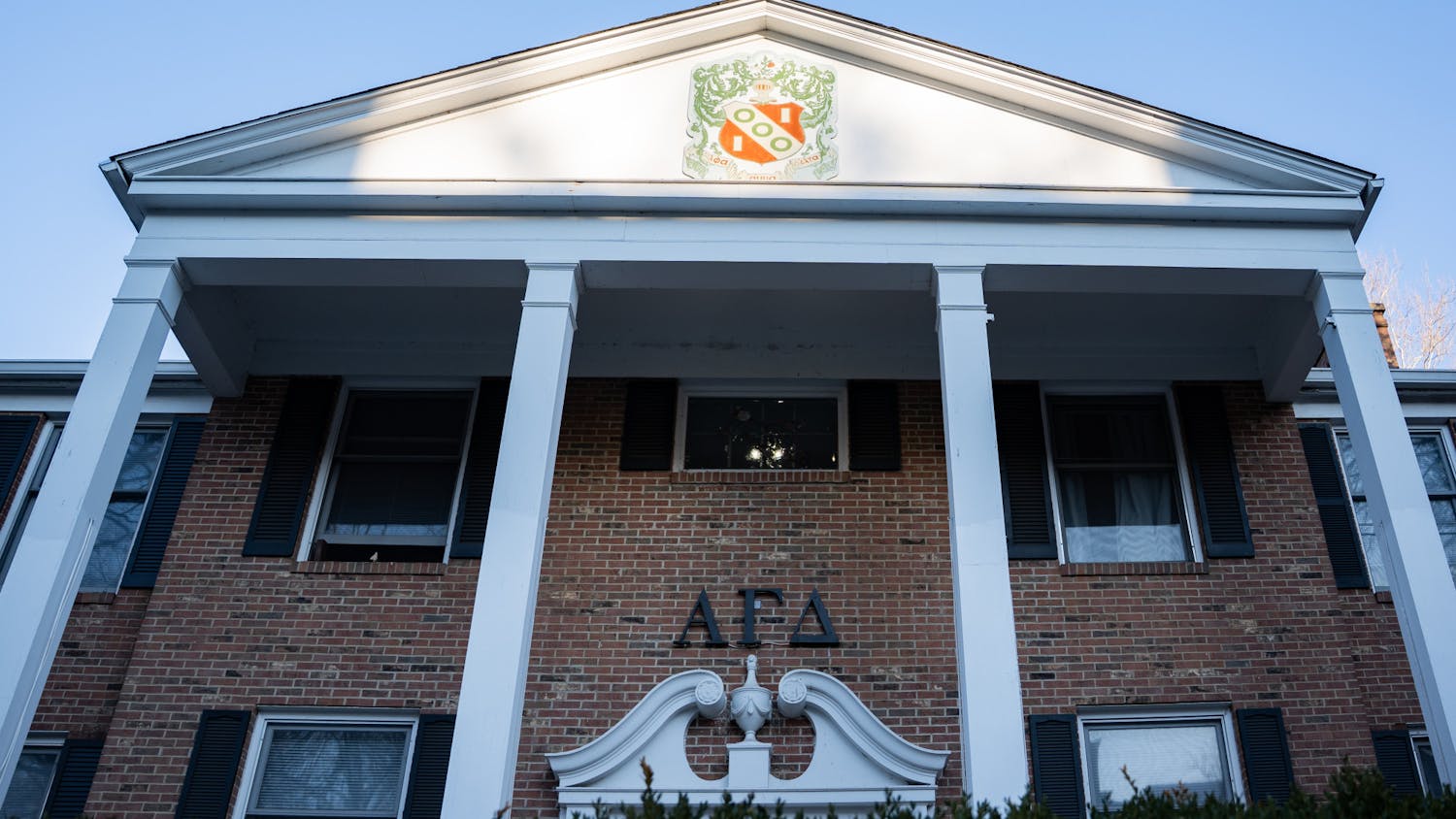Midnight Madness requires the MFA playwrights to write, cast and direct a short play in four days.
For the Ohio University Master of Fine Arts playwriting students, there is no “Syllabus Week.” They don’t get out of class early after only having read the professor’s classroom policies. They don’t take a month to groom their first play.
They only have four days.
The playwrights receive a prompt on the first Monday of classes and have until Friday at 11 p.m. to write, cast and direct a 3- to 5-minute play for the weekly production dubbed Midnight Madness.
“It’s like our own little ‘Saturday Night Live,’ ” said Caitlin Cotter, a first-year graduate student studying costume design and technology who performed in the first Madness of the year.
Fulfilling a need
Madness, formally called Writing For Production, has been a part of the MFA playwriting program for approximately 15 years. At this time Charles Smith, distinguished professor of playwriting and head of the MFA program, realized there was a real need for the playwrights to see their work come to life.
“It became immediately obvious to me, as a professional writer, that if this student writer just got two actors together and read the scene, they would immediately see the problems with it,” he said. “They wanted an outlet and they needed an outlet.”
Smith said this issue stemmed from a dichotomy of either having playwrights’ work be fully produced or nothing, an idea that gave student playwrights few production opportunities in many programs.
The immediate opportunity to constantly write and not just learn theory was one of the reasons Rachel Bykowski, a first-year graduate playwright, said she wanted to come to OU.
“They test out theories in Madness to really understand them, so they don’t invest half a year or a year in a play to realize a theory doesn’t work,” Smith said.
Tick-tock goes the clock
{{tncms-asset app="editorial" id="55350fb4-3979-11e4-affc-0017a43b2370"}}
A four-day deadline is stress-evoking, but for some first-year playwrights it can be particularly frightening. Bianca Sams, a 2014 alumna, recalled her first prompt — to create a sketch set in an elevator without the story centering on being stuck in an elevator. She said she had to go with her first idea — the elevator would be a character itself — because she couldn’t come up with another concept that fit the parameters of the prompt.
“It’s like getting kicked into the deep end of the pool when you can’t swim,” Sams said. “Just get out of the pool. It doesn’t have to be pretty … As a writer, you’re working your way out of this crazy mouse trap that’s been given to you.”
How a playwright tackles Madness differs between writers. Bykowski and her fellow first-years all said they wrote drafts Monday night and continued to revise them throughout the week. On the other side of things is where the name “madness” comes into play.
“I felt really good for almost finishing mine Thursday night and not Friday morning,” said Morgan Patton, a third-year playwright.
That means Patton essentially wrote, cast, rehearsed and directed her short play in about 24-hours.
Making a Madness
Writing For Production is a required class for each semester, every year for the three-year program. The class meets Mondays, and the producer — one of the nine MFA playwrights — assigns a prompt for the week. Neal Adelman, a third-year playwright, was the first producer of this semester and made his prompt “Use Your Damn Hands.”
Adelman said prompts should be challenging yet inspiring, adding that he prefers ones that require activity.
“It’s about subverting audience expectation,” he said. “If we do our jobs, we’ll show this is what (the prompt) can mean, but there’s also all these other things as well.”
For example, in Adelman’s “Use Your Damn Hands” Madness, plays ranged from comedies using hand games to a drama set in a tattoo parlor to a love story that began with a game of Twister.
After a story is established, the playwright needs to find a cast, and roaming around Kantner Hall, the home of the Division of Theater, is typically the way to go.
“You’ll be sitting in the lobby, on the steps or in the courtyard, and a playwright will just come up and ask you to be in their Madness,” said Thomas Daniels, a third-year graduate actor.
With the actors cast, it’s up to the playwright to figure out the not-so-typical rehearsals. Prepping for Madness can take place anywhere — an empty studio, a hallway, the Kantner lobby right before show time — and usually happens for about an hour.
Despite what most would think, it might not always be in the writer’s best interest to rehearse early.
“I’m not going to rehearse until Friday,” Matt Weerts, a first-year playwright, said. “It was a big error to do one on Thursday. It gave me too much time to think about it after.”
{{tncms-asset app="editorial" id="0edfbef2-394b-11e4-a339-0017a43b2370"}}
With all that time to think, Weerts ended up rewriting his entire script Thursday night.
Less than one hour before the show begins, one word can be repeatedly heard while a quick tech rehearsal is held.
“Good,” shouts Justen Locke, a second-year scenic and lighting design graduate student. He explains that he must “design on a fly” as he works out the lighting plan cue by cue, from only the opening and closing images of each short play.
Then, it’s show time and the line — one that started forming around 9:45 p.m. for the first Madness — that filled the Kantner lobby in anticipation hustles into the Hahne Theater, a black box theater seating only about 50 people.
“It was very quick,” Bykowski said. “I can’t even believe it happened on Friday. Then on Monday, I have to do it all over again for the next 28 weeks and next two years. It will certainly keep me on my toes.”
When the curtain falls
When all the stress has subsided, the playwrights agree Madness is an invaluable learning tool.
“When it’s your last one, you got this,” Sams said. “I’ve done so many of them. I know what I can get away with and what works for me.”
Smith said that’s why Madness is an important part of the playwrights’ training: they create a “bag of tricks” of things they know they can do and will work for them.
The playwrights aren’t the only ones who develop tricks. Daniels said Madness is a great place to learn how to lift up off the page — to act while reading an unfamiliar piece — and to truly think on your feet.
Beyond that, Madness simply fosters a collaborative spirit felt within the entire Division of Theater, from lighting design students to actors to the playwrights.
“For me, that’s what real theater is about,” Bykowski said. “New work is the future of theater … and it teaches you how to properly work with a script, how to talk with a writer and develop a working relationship.”
@buzzlightmeryl
mg986611@ohio.edu






